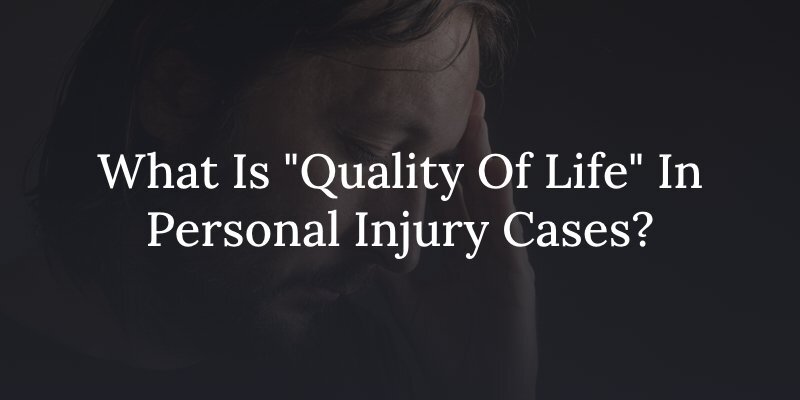Our quality of life is rarely something we appreciate or even consider until an unexpected injury drastically changes it. A person’s quality of life results from their combined physical, mental, and emotional health and their ability or inability to enjoy their life. Quality of life comes into consideration in many St. Louis personal injury cases as an intangible, yet critical, aspect of the injury victim’s non-economic damages.

What Types of Injuries Impact Quality of Life?
Some injuries cause only a temporary change in life quality; for instance, a sprained or fractured ankle may cause the victim to miss a soccer season when they’d ordinarily play. Although this has an impact on their life, the impact is transitory. Most personal injury claims seek compensation for tangible economic damages like medical costs and lost wages, but they also seek compensation for pain and suffering. Missing a soccer season due to an injury could cause temporary distress and may even garner a small amount of compensation for the loss; however, imagine if the injury caused an infection with sepsis and the victim had to undergo an amputation. In that case, they might never play soccer again or would require years of physical therapy and adaptation to a prosthetic device. This would seriously impact the victim’s quality of life. In this case, the civil court would consider the permanent disability as causing a “diminished quality of life” and could award a significant amount of compensation to the injury victim.
Although any injury could become life-altering due to complications as described above, injuries that most commonly cause life-altering changes and diminished quality of life include the following:
- Spinal cord injuries
- Traumatic brain injuries
- Traumatic amputations
- Severe burns
- Loss of an organ or organ function
- Loss of one of the senses like vision or hearing
- Disfigurement
Any of the above injuries result in diminished quality of life for the victim with significant impacts on the ability to earn a living, accomplish daily routines, and enjoy previous activities.
Common Causes of Life-Altering Injuries
Serious injuries resulting in diminished quality of life occur without warning. Common causes of personal injury claims involving diminished quality of life include the following:
- Car accidents
- Pedestrian accidents
- Motorcycle accidents
- Bicycle accidents
- Workplace injuries
- Slip-and-fall accidents
- Defective product injuries
- Violent assaults
- Premises accidents
- Medical malpractice
- Nursing home abuse
Any of the above causes of injuries can result in catastrophic harm and typically involve one party’s negligent, reckless, or intentionally wrongful behavior, leaving them liable for the victim’s damages, including compensation for diminished quality of life.
What Is Diminished Quality of Life in a Personal Injury Claim?
A decrease in an accident victim’s quality of life means they can no longer enjoy activities in which they previously engaged. This could mean they can no longer play outdoor games with their children, they may have lost mobility, they may no longer be able to enjoy a physical relationship with a loved one, or they have cognitive impairment that impacts their mood, behavior, and personality. Severe trauma could also cause diminished life quality due to anxiety, depression, or PTSD.
When an injury victim suffers diminished quality of life, they deserve compensation. Although financial compensation through a personal injury claim cannot undo the injury, it opens doors to the best medical and emotional care available, relieves financial burdens, and provides injury victims with a sense of justice.

